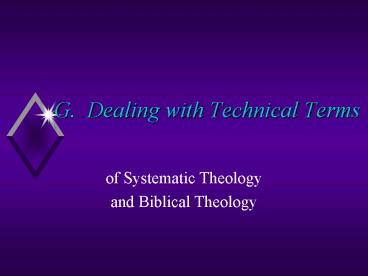G' Dealing with Technical Terms - PowerPoint PPT Presentation
1 / 48
Title:
G' Dealing with Technical Terms
Description:
the Holy Spirit so operates on the chosen people of God, that they are brought ... Jubilee. liberator. of the poor. Revealer. of the. Father. Truth in the Gospels ... – PowerPoint PPT presentation
Number of Views:63
Avg rating:3.0/5.0
Title: G' Dealing with Technical Terms
1
G. Dealing with Technical Terms
- of Systematic Theology
- and Biblical Theology
2
What about Technical Terms?
- Technical terms are useful
- But
summarizing a large amount of rich biblical
teaching
flexible, range of meaning
3
Challenge of Technical Terms
Bible
Systematic Theology
Important distinctions!
4
The Problem Illustrated
Charles Hodge, Systematic Theology 2639 the
Holy Spirit so operates on the chosen people of
God, that they are brought to repentance and
faith, and thus made heirs of eternal life,
through Jesus Christ their Lord. This work
of the Spirit is in the Scriptures called
VOCATION. It is one of the many excellences of
the Reformed Theology that it retains, as far as
possible, Scriptural terms for Scriptural
doctrines.
summary of biblical teaching
1X in KJV, 0 in RSV, NIV
5
The Problem Illustrated (cont.)
It is proper that this should be done. Words and
thoughts are so intimately related that to change
the former, is to modify, more or less seriously,
the latter. And as the words of Scripture are
the words of the Spirit, it is becoming and
important that they should be retained.
no translation?
Clarify your thinking.
in the autograph, and in Greek and Hebrew
6
NT Vocabulary
kale/w, klhto/j, klhsij call, called, calling
no
only Rev. 1714
genna/w beget, give birth
7
Temptation to Leap to Concepts
naïve leap
word
theological concept
kale/w, klhto/j, klhsij call, called, calling
genna/w beget, give birth
8
Likely Meaning in NT
theological concept
word
analogy with spoken command
kale/w, klhto/j, klhsij call, called, calling
aspects of beginning of new life
analogy with birth
genna/w beget, give birth
9
Berkhof on Sanctification
Berkhof, Systematic Theology 527Others, with a
greater degree of probability, derive the word
(daqf) from the root qad, meaning to cut.
This would make the idea of separation the
original idea. The word would then point to
aloofness, separateness, or majesty. Though this
meaning of the words sanctification and
holiness may seem unusual to us, it is in all
probability the fundamental idea expressed by
them.
10
Louis Berkhofs Procedure
- Start with daqf.
- Meaning unrelated to sanctification.
- The rest ignores daqf.
- Use verses on sanctification, no matter what
vocabulary occurs. - Succeeds in spite of bad beginning.
11
Louis Berkhofs Procedure
- Start with daqf, and say it really has a
meaning unrelated to sanctification. - Write the rest of the chapter ignoring your
results with daqf. - Use verses that talk about moral progress in the
Christian life, no matter what vocabulary occurs. - Berkhof succeeds in spite of a bad method at the
beginning.
12
John Murray on Order of Salvation
Having believed, you were marked in him with a
seal, the promised Holy Spirit, (Eph. 113)
13
What Paul Means
believe
sealed with Spirit
pictured through its visible side
confess
actual temporal order
14
Summary of the Situation
- Pauls uses words without technical precision.
- Murray reads in technical meaning.
- Murray is usually better
- He exegetes whole passages, not words.
15
Summary of the Situation
- Paul is not using words hear and believe with
later technical precision to talk about the
absolute beginning of new life. - Murray is interested in this technical question,
and so reads in technical meaning. - Murray is usually better, because he exegetes
whole passages rather than focusing merely on
words.
16
Evaluating Systematic Theology
- Word study means trouble.
- Be balanced in evaluating the past.
- Augustine and Calvin cited passages.
- Post-Reformation developed technical terms and
associated problems. - But they too knew their Bible.
17
Evaluating Systematic Theology
- Word study means trouble.
- Be balanced in evaluating the past.
- Augustine and Calvin did not do word study. They
knew the Bible and cited relevant passages. - Post-Reformation developed technical terms and
associated problems. But they too knew their
Bible.
18
Refocusing Your Study
- Study passages, not words.
- Greek speaker just read Paul.
- The Bible has technical vocabulary blasfhmi/a,
a)po/stoloj, ge/enna. - But even here, easy to see too much.
- Baal worshipers spoke Hebrewgnostics spoke
Greek.
19
Refocusing Your Study
- Study passages, not words.
- What did a native speaker of Greek do? Use a
concordance, or read Paul? - The Bible has technical religious vocabulary
blasfhmi/a, a)po/stoloj, ge/enna. But even here,
it is easy to read in too much, if you see a
commitment to a theory. - Baal worshipers spoke Hebrewgnostics spoke
Greek.
20
False Motives for Word Study
- Laziness
- Desire to appear rigorous
- Imitation of others
- Feeling of profundity
- cf. James Barr, Etymology and the OT, OTS 19
(1974) 1-28.
21
Correlations of Words with Theological Concepts
word
concept
dikaio/w
vindicate
a(gia/zw
consecrate
Watch out!
22
Danger of Reading in
word
concept
dikaio/w in James 221
vindicate
a(gia/zw in 1 Cor. 12
consecrate
23
Theological Jargon
justification
in English, giving reasons
sanctification
covenant
Commun- ication
covenant children
24
Forming a Concept from John 3
concept
word
genna/w, beget
Your choice
25
Forming a Concept of Faith
concept
word
pi/stij, faith
26
What Is a Covenant?
concept
word
Your choice again!
tyrib_at_, covenant
?
a formally ratified (stipulatory) pact with
sanctions a pact ratified by oath
27
Covenant Concept for Conn
- Expand to include all cultures.
God
Creational structure
historical dynamic
28
Covenant for Robertson
- Common core of Gods fellowship with human
beings a bond in blood, sovereignly
administered
29
Covenant Concept for Murray
- One way of salvation
God
grace
elect people
30
Covenant Concept for Kline
- Understand substitutionary grace
- Law principle reward is based on and grounded in
obedience by the human party.
Gods ordering
31
Grace in Kline
- Grace principle reward is based on obedience of
a substitute.
reward
by law
obedience of substitute
partial obedience by undeserving
faith
32
Conflict of Murray and Kline
grace
law
Gods beneficence
responsibility to obey Gods standard
Murray
substitution for demerit
reward on basis of desert
Kline
Potential confusion
33
Murray Interpreting Lev. 185
You shall therefore keep my statutes and my
rules if a person does them, he shall live by
them.
Application Gal. 67-8
Lev. 185
redemption out of Egypt
redemption out of sin
live out of receiving more grace
34
Kline Interpreting Lev. 185
Application Gal. 312-14
Lev. 185
reward to us
live
35
Lessons from Covenant
- Each approach is selective.
- Absolutizing leads to heresy.
- Doing theology is risky, but do it.
- Greater cleverness leads to greater danger.
- Creative theology produces tensions.
- Whole picture comes with the consummation.
- Richness as residing in relations.
36
Lessons from Covenant
- Each approach is selective.
- When one is absolutized, it can lead to heresy.
- Doing theology is risky, but do it.
- Greater cleverness leads to greater danger.
- Creative theology produces tensions.
- Whole picture comes with the consummation.
- Think of the richness as residing in relations
among texts.
37
H. Using Multiple Perspectives
38
What Is Symphonic Theology?
- A style of life, interpretation, and thinking in
which an endeavor is made to take a number of
limited complementary starting principles and use
them as perspectives for interpreting and
understanding in a harmony the whole of a given
subject area. (See the whole jewel through one
facet.)
Exploring
39
1. The Four Gospels as an Example
40
Perspectives from Four Gospels
One Lord Jesus Christ
King in the line of David
Warring against the kingdom of evil spirits
Jubilee liberator of the poor
Revealer of the Father
41
Truth in the Gospels
- Each Gospel has a different human perspective.
- Each has a different divine perspective.
- All are true.
- God does not contradict himself.
- Any one Gospel presents Christ truly.
- God affirms four perspectives.
42
Truth in the Gospels
- Each Gospel has a different human perspective.
- Each Gospel has a different divine perspective.
- All the Gospels are completely true. God does
not contradict himself. - Any one Gospel presents the true Christ.
- God affirms the validity of four perspectives on
Christ.
43
Knowing
- Differences in manner of knowing Knowing
includes unity and diversity.
44
Knowing
- Differences in perspective may include
differences in manner of grasping and digesting
truth. Knowing includes unity and diversity.
45
Contrasts with Relativism
Relativism
Biblical Symphony
- The Bibles statements are absolutely true.
- Grow in truth and remove error.
- Truth overwhelmingly surrounds us.
- Learn more from all four Gospels.
- No real truth.
- Truth and error harmonize.
- Reality inaccessible.
- Everyone confined to his own view.
Antithesis
46
Symphony Imitates Trinity
God is 3 in 1
Sound starting point.
47
2. Diversity in the Body of Christ
48
Perspectives in the Body
1 Cor. 12
Part of Gods plan
49
The Love Commandment
Love your neighbor as yourself
50
Knowing in the Body of Christ
- Knowing in the body of Christ includes
- unity (shared doctrine) and
- diversity (manner and grasp of truth).
51
Kinds of Diversity
In personality
In modes of knowing
In spiritual gifts
1 Cor. 12
Four Gospels
Various biblical characters
52
3. Using Perspectives
53
Using Perspectives in Contextualizing Theology
- Guilt
- Western past
- Tribes
- Black US
- Orient
- USA now
- Justification
- Evil spirits
- Holy war
- Dignity, release from oppression
- Exodus
- Shame
- Shame of cross
- Meaninglessness
- Adoption
Lots of potential!
54
Multiperspective Analysis
- One passage enjoys many relations.
- Look at the passage through a theme.
- Themes suggest connections to Christ.
- Themes help to preach Christ (Luke 2444-49).
55
Multiperspective Analysis
- Any one passage enjoys many kinds of relations to
the rest of the Bible. - So look at the passage through any of a number of
thematic emphases. - These themes suggest connections forward to
Christ. - Hence, this reflection helps us to preach Christ
(Luke 2444-49).
56
Assignment in Perspectives
- Read through pp. 8.19-8.21.
- Apply the same procedure to Isa. 5211-12.
- Use perspectives 1b, 2a, 3d, 5a, and 5d.
- For 1b and 2a, connect to Christ.
- Turn in a summary.
Hope you have fun!
57
Assignment in Perspectives
- Read through the attached explanation and study
the example of using multiple perspectives with
Isa. 5121-23. - Apply the same procedure to Isa. 5211-12.
- Use perspectives 1b, 2a, 3d, 5a, and 5d.
- For 1b and 2a, connect your findings forward to
Christ. - Write a summary on 8 1/2 X 11 paper, preferably
one page, to turn in.
Hope you have fun!































